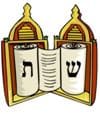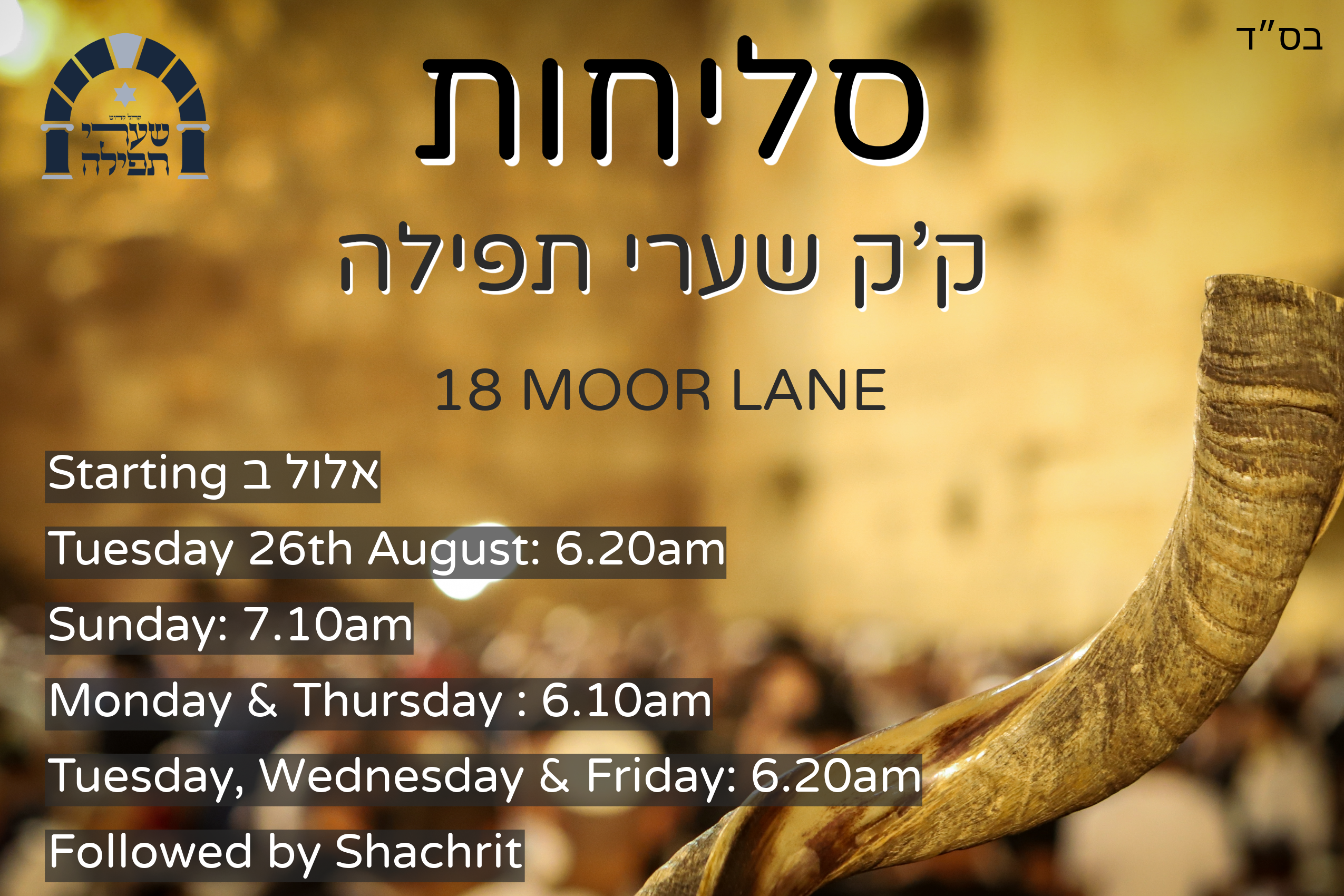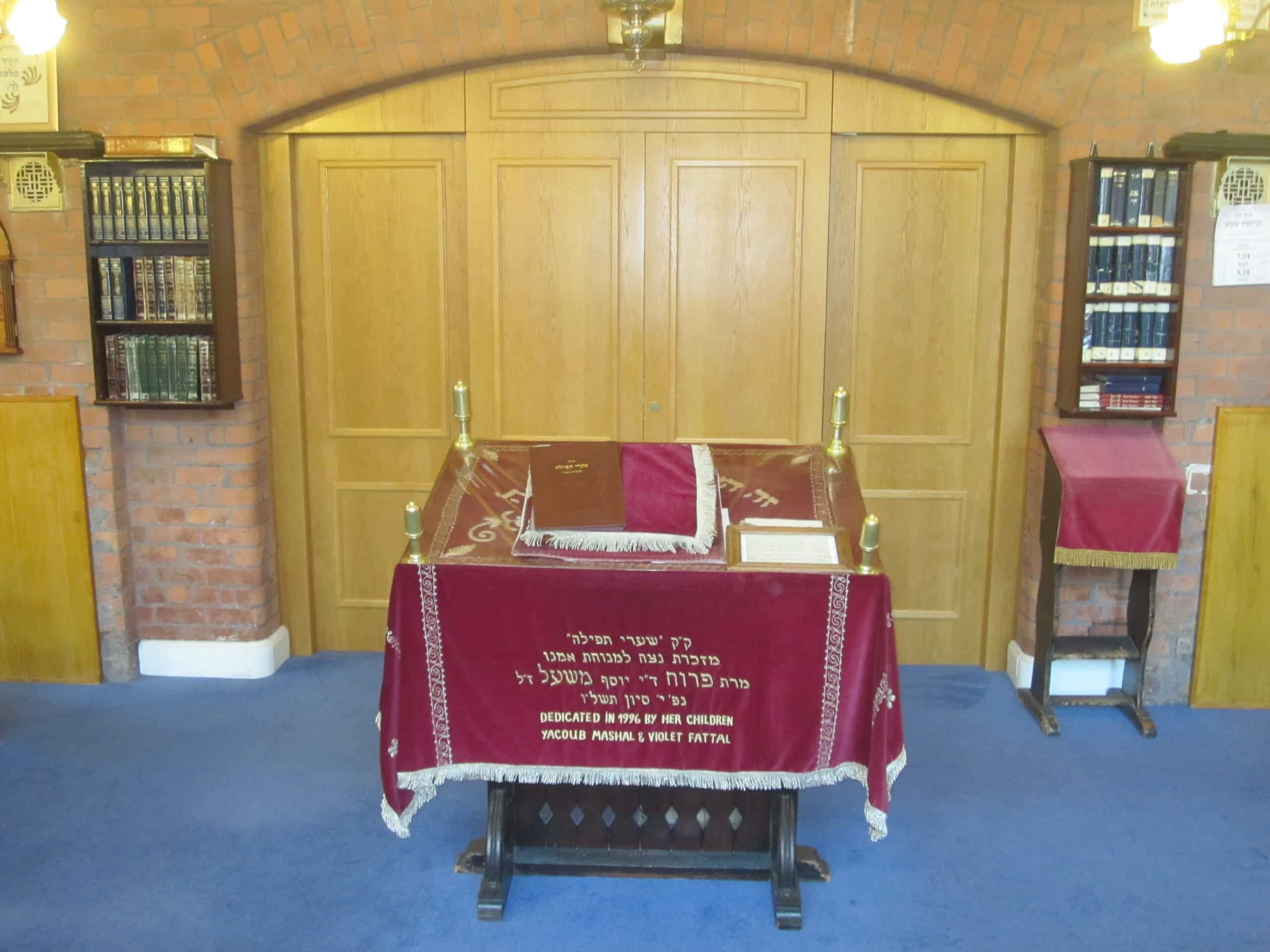


****

חודש אלול
We are proposing to collaborate with a worldwide initiative over Elul
where we, as a kehilla, work on stopping talking in the Bet Knesset during tefilla and keriat hatorah.
Rabbi Stamler spoke last week about the benefits of such efforts this Shabbat,
and we hope everyone will take part with much, silent, enthusiasm.
The initiative will also generate a sponsor towards our Kiddushim
to help us celebrate this achievement outside of the Bet Hakeneset.
As part of this we will also say the misheberach of the
Tosafot Yom Tov on the Shabbatot in Elul for those who remain silent during tefillah.
This initiative is intended to help preserve the sanctity and respect of the Bet Knesset.
And whilst we already enjoy a respectful environment in our Bet Hakeneset
we would like to work on this strength of ours. May it be a great zechut for us and all AM yisrael.
Chizku VeImtsu
*********
לוח זמני תפלה לקיץ תשפ״ה
Summer Timetable 5785 – 2025
מוצאי שבת | ערבית )מוצ”ש( | שקיעה | סוף זמן קראת שמע | זמן שבת | פלג מנחה (תה״ד) | פלג מנחה (לבוש) | מנחה וקבלת שבת | תאריך | שבת פרשת |
Shabbat Ends | Arbit | Sunset | Shema to be read before | Candles to be |
| Earliest Candle lighting | Minha & Kabbalat Shabbat* | Date | Parasha |
PM | PM | PM | AM | PM | PM | PM | PM |
|
|
8:37 | 8:33 | 7:45 | 9:46 | 7:33 | 6:56 | 6:26 | 6:45 | 5/6 Sep | כי תצא |
🕯️SUMMER TIMES FOR SHABBAT 🕯️
שבת
קרבנות
9:00 am
הודו
9:15 am
מנחה
6:30 pm
********
The Torah describes the only permissible way a woman captured in battle may be married. If a man marries two wives, and the less-favored wife bears a firstborn son, this son's right to inherit a double portion is protected against the father's desire to favor the child of the favored wife. The penalty for a rebellious son, who will inevitably degenerate into a monstrous criminal, is stoning. A body must not be left on the gallows overnight, because it had housed a holy soul. Lost property must be returned. Men are forbidden from wearing women's clothing and vice versa. A mother bird may not be taken together with her eggs. A fence must be built around the roof of a house. It is forbidden to plant a mixture of seeds, to plow with an ox and a donkey together, or to combine wool and linen in a garment. A four-cornered garment must have twisted threads tzitzit on its corners. Laws regarding illicit relationships are detailed. When Israel goes to war, the camp must be governed by rules of spiritual purity. An escaped slave must not be returned to his master. Taking interest for lending to a Jew is forbidden. Bnei Yisrael are not to make vows. A worker may eat of the fruit he is harvesting. Divorce and marriage are legislated. For the first year of marriage, a husband is exempt from the army and stays home to rejoice with his wife. Tools of labor may not be impounded, as this prevents the debtor from earning a living. The penalty for kidnapping for profit is death. Removal of the signs of the disease tzara'at is forbidden. Even for an overdue loan, the creditor must return the collateral daily if the debtor needs it. Workers' pay must not be delayed. The guilty may not be subjugated by punishing an innocent relative. Because of their vulnerability, converts and orphans have special rights of protection. The poor are to have a portion of the harvest. A court may impose lashes. An ox must not be muzzled while threshing. It is a mitzvah for a man to marry his brother's widow if the deceased left no offspring. Weights and measures must be accurate and used honestly. This Torah portion concludes with the mitzvah to erase the name of Amalek, for, in spite of knowing about the Exodus, they ambushed the Jewish People.

ותשובה ותפילה וצדקה
ידוע הלימוד מדברי רבותינו, כי לפעמים ישנה גזירה על האדם, אבל “תשובה ותפילה וצדקה – מעבירין את רוע הגזירה”, כלומר, יש בכח אלו שלושת הדברים, לבטל את הגזירות הרעות.
ובספר כסא דוד, סיפר מרן רבינו החיד”א, אודות רבה של ירושלים, הגאון רבי דוד יצחקי, (אביו של הגאון רבי אברהם יצחקי, המחבר ספר זרע אברהם), שהיה דחוק מאד בפרנסתו, ופעם אחת נאלץ מרוב דוחקו, ללוות זהוב שלם מאדם אחר. רבי דוד הניח את הזהוב בכיסו, והמשיך בדרכו.
לפתע, ניגש אליו אדם עני, וביקש ממנו צדקה, רבי דוד, שלא שם לבו באותה העת כי בכיסו נמצא זהוב, הכניס ידו לכיסו, ונטל משם מטבע, שהיה סבור שהוא פרוטה, ונתנו בידו של העני.
כשבא לביתו, חיפש את הזהוב, ונזכר במה שאירע לו. ” שָׂמַח הָרַב, וַיָּגֶל גִּלָּה אַחַר גִּלָּה”, שזיכהו ה' יתברך לתת זהוב לעני, שאילו היה שם לב, לא היה זוכה למצוה גדולה כל כך, שהרי אינו ראוי לכך מחמת עניותו, ועתה שמח, שזיכהו ה' במצוה יקרה כל כך. “כל אותו היום, לא פסקה שמחה ממנו”.
Repentance, Prayer, and Charity
Our Sages taught that sometimes, although there may be a harsh decree hovering over an individual, “Repentance, prayer, and charity remove the harsh decree.”
Repentance
Repentance refers to the Mitzvah of Teshuva. Every individual must inspect his ways and improve his actions. Included in this is what was customary in earlier generations when many people would spend this month engaged in fasts. Even in our days, many people tend to abstain from different forms of luxuries during this time, such as excessive feasts and parties. One should certainly not be involved in all sorts of random entertainment activities, for these days should be completely sanctified to Hashem.
Prayer
Prayer refers to praying fervently before Hashem with a broken heart and even with tears, as the verse states, “A broken and downtrodden heart You shall not reject.” If one merely pays attention to the words of the various prayers, one will immediately feel a deep connection to these ancient and holy words, especially during the Amida prayer. When one who concentrates properly on one’s prayer, this serves as a great merit for acceptance of one’s prayers, as the verse states, “Prepare their hearts, Your ears shall listen,” meaning that if Hashem prepares one’s heart to concentrate on one’s prayer, this is a sign and merit that one’s prayer will be answered.
Charity
Charity refers to the Mitzvah of Tzedakah which one should engage in joyously during these days. Unless one is donating the charity funds immediately, one should take care to always say Bli Neder when making a pledge or commitment so as not to transgress the sin of vowing and not paying, G-d-forbid. The Gemara in Masechet Ta’anit states that droughts plague the world because of those who publicly pledge Tzedakah and do not pay it. One is punished measure for measure, for one’s livelihood is likened to clouds and wind, which are indicative of the rain about to begin to fall; however, it will all end in losses. One should therefore be very careful about this matter.
Loving Kindness
The verse in Michah states: “You have been told, man, what is good and what Hashem requires of you: Only to do justice, to love kindness, and to walk modestly with your G-d.” The verse does not say to “perform kindness,” rather to “love kindness,” for one must become accustomed to love charity and kindness and to perform them with all of one’s heart.
Maran Ha’Chida recounts in his Sefer Kisseh David that once, Hagaon Harav David Yitzchaki, Chief Rabbi of Jerusalem (and father of Hagaon Harav Avraham Yitzchaki, author of Sefer Zera Avraham), was in dire financial straits and as a result, borrowed a gold coin from another individual. Rav David put the coin in his pocket and continued on his way.
Suddenly, a poor man came up to Rav David and asked for charity. Rav David, who had forgotten that he had a gold coin in his pocket, reached into his pocket, pulled out the gold coin thinking it was a penny, and gave it to the pauper.
When he arrived home, Rav David realized what had transpired. He was overjoyed with this Mitzvah, for had he realized at the time that the gold coin was in his pocket, he would not have merited such a great Mitzvah due to his own great poverty. Maran Ha’Chida concludes, “This joy did not leave him that entire day.”